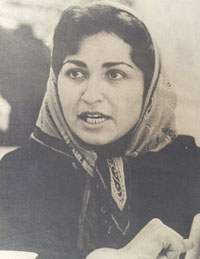|
RAWA, the Revolutionary Association of the Women of Afghanistan, was
established in Kabul, Afghanistan, in 1977 as an independent
political/social organization of Afghan women fighting for human rights and for social justice in Afghanistan. The founders were a number of
Afghan woman intellectuals under the sagacious leadership of Meena who in 1987 was assassinated in
Quetta, Pakistan, by Afghan agents of the then KGB in connivance with fundamentalist band of Gulbuddin Hekmatyar
. RAWA‚s objective was to involve an increasing number of Afghan women in social and political activities aimed at acquiring women‚s
human rights and contributing to the struggle for the establishment of a
government based on democratic and secular values in Afghanistan. Despite the suffocating political atmosphere, RAWA very soon became
involved in widespread activities in different socio-political arenas including education, health and income generation as well as political
agitation.

Meena
Before the Moscow-directed coup d‚état of April 1978 in Afghanistan,
RAWA‚s activities were confined to agitation for women‚s rights and democracy, but after the coup and particularly after the Soviet occupation
of Afghanistan in December 1979, RAWA became directly involved in the war of resistance. In contradistinction to the absolute majority of the
vaunted Islamic fundamentalist "freedom fighters" of the anti-Soviet war
of resistance, RAWA from the outset advocated democracy and secularism. Despite the horrors and the political oppression, RAWA‚s
appeal and influence grew in the years of the Soviet occupation and a growing number of RAWA activists were sent to work among refugee
women in Pakistan. For the purpose of addressing the immediate needs of refugee women and children, RAWA established schools with hostels
for boys and girls, a hospital for refugee Afghan women and children in
Quetta, Pakistan with mobile teams. In addition, it conducted nursing courses, literacy courses and vocational training courses for women.
Demonstrations against the Soviet invaders and their stooges and later
on against the fundamentalists, and unrelenting exposure of their treason
and heinous crimes has been a hallmark of RAWA‚s political activities. It
was in consequence of its anti-Soviet occupationist struggle and agitation
that RAWA was marked for annihilation by the Soviets and their cronies, while the Islamic fundamentalists vented their wrath on our organisation
for our pro-democracy, pro-secularist and anti-fundamentalist stance. Our
uncompromising attitude against these two enemies of our people has
cost us dear, as witnessed by the martyrdom of our founding leader and a
large number of our key activists, but we have unswervingly stood, and
continue to stand, by our principles despite the deadly blows that we have
been dealt.
For the purpose of propagating our views, aims and objectives, and to
give Afghan women social and political awareness in regard to their rights
and potentialities, RAWA launched a bilingual
(Persian/Pashtu) magazine,
Payam-e-Zan (Woman's Message) in 1981. Publication of this magazine is
on-going and by-issues in Urdu and English for
non-Persian/Pashtu
speakers.
Since the overthrow of the Soviet-installed puppet regime in 1992 the
focus of RAWA‚s political struggle has been against the fundamentalists‚
and the ultra-fundamentalist Taliban‚s criminal policies and atrocities
against the people of Afghanistan in general and their incredibly
ultra-male-chauvinistic and anti-woman orientation in particular. Apart
from the political challenges facing RAWA, tremendous social and relief
work amongst unimaginably traumatised women and children lie ahead of
us, but unfortunately we do not at the moment enjoy any support from
international NGOs, therefore our social programmes are presently greatly
reduced for lack of funds.
|